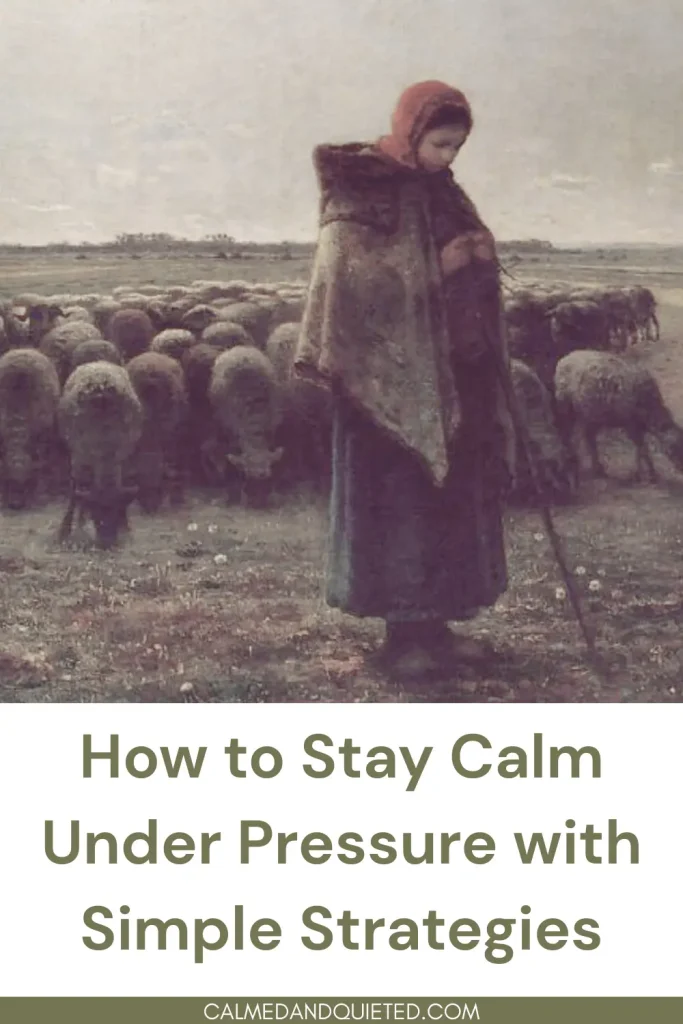
How to Stay Calm Under Pressure with Simple Strategies
Learning to stay calm under pressure isn’t just about surviving the moment—it’s about thriving through it with faith and practical strategies. Together, let’s explore ways to manage stress and navigate life’s challenges with grace and resilience.
Finding Calm in the Chaos
Pressure is inevitable in life. From looming deadlines to unexpected emergencies, high-stress situations often seem to pop up at the worst possible moments. They challenge our peace, test our patience, and leave us feeling overwhelmed. As Christian women, we don’t have to face these moments alone. God’s Word reminds us that He is with us, even in the most chaotic situations, offering guidance, strength, and peace.
Why Staying Calm Under Pressure Is Essential for Your Well-Being
Life has a way of throwing curveballs—unexpected job interviews, a hard deadline at work, or a traffic jam when you’re already late. In these moments, the pressure builds, and the stress response kicks in. Your heart rate accelerates, your thoughts race, and it feels like everything is spiraling out of control. Staying calm in these high-pressure situations isn’t just about survival; it’s about thriving. Managing stress levels effectively protects your physical health and helps you make better decisions, even when the stakes are high.
How Faith Can Provide a Foundation for Peace During Stressful Times
In times of stress, faith becomes a crucial part of finding peace. When my life feels overwhelming, I remind myself of Philippians 4:6-7, which encourages us to pray instead of worry. It’s not always easy, but taking a moment to focus on God’s promises brings clarity and calmness. Prayer has a way of grounding us in the present moment, reminding us that we don’t face challenges alone.
Understanding the Impact of Stress
Stress triggers a number of physiological changes in your body. When faced with a stressful situation, your heart rate spikes, your breathing quickens, and your muscles tense up as part of the body’s fight-or-flight response. While this reaction can be helpful in true emergencies, repeated activation due to everyday pressures can lead to chronic stress.
In my own experience, I’ve noticed how stress can cloud my thinking, making it harder to focus on even simple tasks. This response isn’t just mental; it’s physical too. When stress hormones like cortisol are consistently elevated, they can negatively affect your immune system, energy level, and overall health.
What Happens to Your Body and Mind Under Pressure
Stress triggers a cascade of reactions in your body. Your adrenal glands release cortisol, your breathing quickens, and your parasympathetic nervous system takes a back seat. While this fight-or-flight response is natural, chronic stress can lead to health issues like high blood pressure, heart disease, and weakened immune function.
The Spiritual and Emotional Toll of Living with Constant Stress
Stress doesn’t just impact our bodies; it weighs heavily on our hearts. When I’ve allowed stress to take over, I’ve found myself feeling disconnected from God and others. It’s easy to let anxious thoughts spiral, drowning out the peace that God so freely offers. The good news is that by recognizing this toll, we can turn to Him for renewal and restoration.
Recognizing Early Signs That Stress Is Affecting Your Calm
Stress often manifests subtly before it becomes overwhelming. You might notice you’re snapping at loved ones, losing sleep, or spending too much time falling down the rabbit hole of anxious thoughts. By identifying these early signs, you can address them before they snowball. Before stress becomes overwhelming, your body and mind often give subtle clues: difficulty sleeping, irritability, or an inability to focus. I’ve learned to take these signs seriously. When I notice myself reacting sharply or feeling unusually fatigued, it’s a signal that I need to pause, pray, and recalibrate.
How to Ground Yourself with Faith-Based Strategies
When life feels overwhelming, grounding yourself in your faith provides stability. Turning to prayer and God’s Word can be a powerful way to find peace and regain perspective.
Prayer has always been my first response during times of stress. When faced with a high-pressure situation, I find a quiet place to talk to God. Simply sharing my worries and asking for His guidance helps me feel centered. I remember one particular instance during a job interview when a silent prayer steadied my nerves and helped me focus on what truly mattered.
The Bible is filled with verses that anchor us in times of stress. Whether it’s “Be still and know that I am God” (Psalm 46:10) or “Come to me, all who are weary” (Matthew 11:28), meditating on God’s Word provides reassurance and hope.
The hardest part of faith is letting go of control. But trusting that God’s plan is bigger than our worst-case scenarios gives us the strength to keep going, even when we can’t see the full picture.
Practical Techniques for Staying Calm
Sometimes, the simplest actions make the biggest difference. From breathing exercises to journaling, practical techniques can help you handle stress with grace and confidence.
Breathing Exercises to Help Reset Your Mind and Body
Deep breathing is one of the simplest yet most effective ways to calm yourself during stressful situations. I rely on the 4-4-4-4 method, also known as box breathing: inhale for four seconds, hold for four, exhale for four, and pause for another four seconds before repeating. This technique not only lowers your heart rate but also signals your body that it’s safe to relax, easing the fight-or-flight response.
The Power of a Short Walk to Release Tension and Refocus
Stepping away from a stressful situation for even a few minutes can work wonders. A short walk allows you to reset, clear your head, and return with a calmer demeanor. I often take these moments to pray quietly, asking God for guidance and clarity.
Progressive Muscle Relaxation to Release Built-Up Tension
Progressive muscle relaxation involves tensing and then slowly relaxing each muscle group in your body, starting from your toes and working up to your head. This practice helps release physical tension, which often accompanies high-stress situations. It’s particularly helpful when dealing with pressure before a big event, like a job interview or presentation.
Singing or Listening to Worship Music for Emotional Release
Turning to worship music is one of the most comforting strategies I’ve found. Singing along to a favorite hymn or praise song helps shift focus from the stressful situation to God’s presence. Music has a way of soothing the soul while reminding us of His steadfast love.
Journaling as a Tool for Stress Relief
Writing down your thoughts and prayers in a journal can help you process what’s happening and release bottled-up emotions. I often close my journaling sessions with gratitude, listing three blessings God has given me that day. This simple act fosters a positive attitude and helps me refocus on His faithfulness.
Scripture Memory as a Calming Anchor
Memorizing scripture provides a mental anchor in times of stress. Verses like Psalm 23:4 or Isaiah 26:3 remind us of God’s promises and His presence, no matter how overwhelming life feels. Repeating these verses in your mind can replace negative thoughts with words of hope and truth.
Using Physical Activity to Burn Off Nervous Energy
Engaging in a form of physical activity, such as stretching or light exercises, can help dissipate stress hormones and release pent-up energy. I keep a small set of hand weights nearby and take a few moments to lift them when I feel the tension rising. Exercise not only improves physical health but also provides mental clarity.
Creating a Quiet Space for Reflection and Prayer
When the pressure builds, retreating to a designated quiet space can help. Whether it’s a corner of your home with a chair and Bible or a spot outdoors, this intentional pause allows you to connect with God and gain perspective.
Practicing Acts of Service to Shift Focus
One surprising way to stay calm is by helping others. Whether it’s calling a trusted friend to check on them or cooking a meal for a neighbor, serving shifts your focus from your own stress to meeting someone else’s needs. These small acts remind us of the bigger picture and God’s call to love and care for one another.
These techniques, grounded in faith and practical wisdom, can help you navigate even the most challenging moments with grace and peace. Each strategy offers a unique way to realign your thoughts and actions with God’s truth, equipping you to stay calm under pressure.
When life feels heavy and peace seems far away, you don’t have to carry it alone. My guide, Biblical Stress Management: How to Find God’s Peace in Overwhelming Times, will help you quiet anxious thoughts, rest in His presence, and rediscover calm through faith.
How to Create a Calm Environment
Your physical space greatly influences your mental and emotional state. By creating a peaceful environment, you can foster calmness and focus in your daily life.
Declutter Your Physical Space to Calm Your Mind
A cluttered house adds to mental clutter. Cleaning up a quiet space, like your desk or a corner of the living room, creates a more calming environment. A tidy space leads to a tidy mind, making it easier to face life’s challenges.
Sett Up a Prayer Corner or Calming Area in Your Home
Having a designated quiet place for prayer or reflection can become a sanctuary during stressful moments. Add calming elements like soft lighting, calm music, or a comfortable chair to make it a place you’ll want to retreat to often.
The Role of Soothing Music or Scents in Reducing Stress
Calm music or essential oils like lavender can instantly transform your space. These sensory tools engage the relaxation response, providing a healthy way to unwind after a long day.
How to Manage Pressure with Time and Task Organization
A disorganized schedule can make even small tasks feel daunting. By learning to manage your time effectively, you can reduce stress and approach each day with greater ease.
Break Down Overwhelming Tasks into Manageable Steps
Big tasks can feel insurmountable, but breaking them down into smaller pieces makes them achievable. Start with the first step and focus on completing one thing at a time. For example, if you’re overwhelmed by cleaning your apartment, start with just one area—like organizing the kitchen counters or clearing a single drawer. Once that’s done, move to the next small section.
If you’re preparing for a big presentation at work, focus first on creating an outline before worrying about the visuals or delivery. Similarly, when faced with planning an event, begin with a simple to-do list—decide on the date and venue first, then tackle guest lists and details later.
By concentrating on completing one small task at a time, you not only reduce the pressure but also build a sense of accomplishment as you progress. These small victories keep you motivated to take on the next step.
Use a To-Do List to Regain Control of Your Day
A to-do list is a great way to organize your thoughts and prioritize what matters most. Write down three tasks for the day, and cross them off as you complete them. This small act brings a sense of accomplishment and lowers stress levels.
or example, if your day feels overwhelming, your to-do list might look like this:
- Spend 15 minutes reading and reflecting on a Bible passage.
- Tidy up the living room by putting away clutter.
- Prep dinner for the evening.
As you complete each task, cross it off the list. Seeing even small accomplishments adds a sense of progress and reduces the stress of everything feeling unfinished.
Prioritize your Tasks and Let Go of Perfectionism
Sometimes, good enough is enough. Letting go of perfectionism frees up cognitive resources and allows you to focus on what truly matters in your everyday life.
Imagine you have a long list of tasks: responding to emails, preparing for a Bible study group, grocery shopping, and tidying up your apartment.
Start by identifying what’s both urgent and important. For example, if your Bible study is tomorrow, preparing for it might take top priority. Grocery shopping can come next if you’re running low on essentials, while responding to non-urgent emails can wait until later in the day.
As for tidying up, perhaps just focusing on clearing one cluttered corner is “good enough” for now. By prioritizing based on urgency and importance, you conserve energy for the tasks that truly matter while letting go of perfectionism for the less critical ones.
Long-Term Strategies for Stress Management
True stress management requires consistency and commitment. Adopting healthy habits and nurturing your well-being sets the foundation for long-term calm and resilience.
Develop a Daily Routine That Nurtures Calmness and Peace
Consistency is key. A daily routine that includes regular Bible meditation and prayer, enough sleep, and a balanced diet helps create a foundation for calmness.
Regular physical activity improves both mental and physical health. Pair this with a bedtime routine that prioritizes quality sleep, and you’ll feel more equipped to handle life’s demands.
No one should navigate stress alone. Reach out to trusted friends, family, or a support network for emotional support. Having someone to share your burdens with makes all the difference.
How to Find Purpose in the Pressure
Pressure can feel overwhelming, but it often carries hidden opportunities. By shifting your perspective, you can discover purpose and growth in the challenges you face.
Stressful situations often reveal our deepest strengths. Reflecting on how God has carried you through hard times reminds you of His faithfulness and provision.
Every challenge is an opportunity to grow in grace, patience, and trust. The next time you face pressure, ask yourself: What can I learn from this moment?
God’s strength is made perfect in our weakness. Trusting Him in the midst of difficulty reminds us that we’re never alone, no matter how high the pressure.
Encouragement to Embrace a Calm and Centered Life
Cultivating calmness isn’t just for your benefit—it’s for those around you, too. By finding peace in times of stress, you inspire others to seek the same. Remember, true calm doesn’t come from circumstances but from trusting in God’s promises.
Staying calm under pressure is a journey, not a destination. It’s about relying on God, implementing practical strategies, and giving yourself grace when life feels overwhelming.
PIN ME FOR LATER!

How do you stay calm under pressure and find peace in stressful situations? Share your story or favorite strategies in the comments. Let’s encourage one another to live with grace and peace, no matter what life throws our way.




